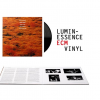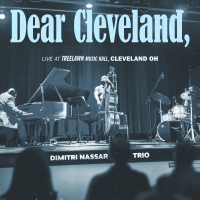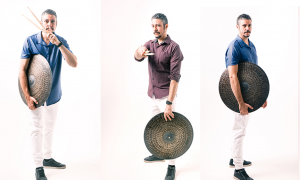Home » Jazz Articles » Interview » Kenny Garrett Speaks Through The Soul of His Jazz
Kenny Garrett Speaks Through The Soul of His Jazz
KG: Actually, I planned to have Ronald Bruner, Rudy Bird and Lenny White playing. I really wanted to have more of a drum core, and they would say that'd probably be too much. So, I only had Ronald Bruner and Rudy Bird on the session, and Lenny just happened to come by. So, I put him to work. I said, okay, get him a snare and come on and play. I was trying to create more of a marching band vibe to it.
AAJ: You have said you don't think a lot of people understand your history. You were talking about the new record, and that the project might be a surprise to some. "When I heard Miles do "Human Nature" for the first time, I knew exactly what I was going to play." So there is a relation from Miles to Sounds from the Ancestors?
KG: Some of that, yes. One track was kind of reminiscent of that, but I think the thing about the history is that people, once they hear one style of music, that's what they expect. We are artists and a lot of times what I'm trying to do is to be the best I can be, and sometimes that means you have to do something that's challenging. When I'm playing with Chick Corea, I'm being challenged. When I'm playing with Chucho Valdes, I'm being challenged. I mean, they're playing a different style of music, so all those things are part of the growth and part of the history. The reason I say people don't know my history. I remember I used to talk to Brother Yusef Lateef every day. We had the same birthday, and I thought I knew his history. He would say, well, I did this record with the African-American Suite, and I did this record. I didn't know he did that or some of the other music with string arrangements for orchestra. Sometimes people don't know because they might not have heard you. You might find a young musician who came up to me who just heard Sounds from the Ancestors. Maybe they don't even know about Introducing Kenny Garrett. Maybe they don't even know about any of the others. That's why I say people don't know my history because it's hard to know the history of any musician unless you've started at the beginning with them and studied all their records.
AAJ: We're getting back to the concept of chapters in your book. How many records have you made?
KG: I don't even know. I don't even think about it like that, but I do think that when I listen, I say, oh, wow, that's interesting where you were at that time. That reminds me of something else. You know? Even when I did, I wasn't trying to do Triology (Warner Brothers, 1995). I was experimenting. I was trying to see if I could do a trio record. But when I went to East Germany, someone recorded me trying to record this music for myself to study to see what I wanted to do, and then I was kind of forced to do it. They released a record and it was a bootleg CD called Stars and Stripes, and they said it was "Live at Fat Tuesday's." I never played at Fat Tuesday's, and at that point I knew I was compelled to do this trio record, and I'm glad I did it. The same thing when I did Pursuance (The Music of John Coltrane) (Warner Brothers, 1996). It was a challenge; It wasn't my idea. Who was in that trio? Well, that was Brian Blade and Charnett Moffett, and also there was Kyoshi Kitagawa playing bass on some of the tracks.
AAJ: For the new album—Who Killed AI—where did the title come from?
KG: That came from a friend of mine named Skip. I was letting people hear a couple of tracks, and so I played the first track and he said, "Man, that sounded like who killed AI?" I liked that because it kind of made me think. I said, whoa, that's interesting. The conversation was about AI. I think they had a program on "60 Minutes." Maybe he had seen that. But it went with the concept.
AAJ: Categories are so limiting. Maybe it's because you've been around for many years, but expanding your horizons has never been more apparent than on this record. It's stunning how you manage to get the saxophone to sound like a wah-wah guitar and other instruments as well.
KG: I'm not new to changing the tone of my instrument. I used a Digitech box on the live record with Pharoah. Of course, with Miles at the time we were experimenting with a lot of different effects. We created lots of different sounds with synths on Sounds from the Ancestors, so maybe those sounds weren't all from the ancestors except the elders were coming through me.
AAJ: You said you wanted people to hear the album as one journey, which Chick Corea once said about a Return to Forever album.
KG: When I would listen to the music, I was listening to it on my walk. Maybe I heard something different this time that I didn't hear before, because as I'm walking, I am walking in fresh air, At the same time, it's like, well, I didn't hear that before, but I've been listening to this pretty much every day, and I wanted people to experience that. Just listen to it. Start from the beginning and hear it, let it take you on a journey, and that's what I like to do live, too. I like to take the audience on a journey. I don't like to say what it is. I just like to go on the journey. Let's just take this journey. Now. The next step might be something, so let's take that journey. This comes to mind. Let's take this journey. We're just trying to say it's not always the same. It might be the same music, but let's try something a little different here and see what happens.
AAJ: Well, there's a lot to be said for listening to this album, or most albums, as a whole. But it would be interesting to hear your thoughts on some of the tracks. On "Ascendants" it starts with you counting off imitating Miles' raspy voice "'tenteen, eleventeen, twelveteen, thirteen' then goes into your solo over Svoy's synth and electronic drum foundation. What were you thinking of counting it down?
KG: I just started thinking about the titles. We just created the titles out of the concept of the record, but "Ascendants" and then "Miles Running Down AI" was, well ... I had a whole bunch of titles for that, but that's the one that seemed to represent when I would listen to it with the guitar and the wah-wah. I actually was thinking about Miles playing at Woodstock, and I'm thinking we don't have Woodstock, so it'll be Miles at Coachella. That's the sound I envisioned. I would love to be able to play at Coachella with the group I was putting together for this record.
AAJ: The title is plainly a take-off on "Miles Runs the Voodoo Down" from Bitches Brew. It has a futuristic, kalimba-like feel of Japanese anime music, deconstructed.
KG: I'm stretching out the melody, the way I played it with Miles but with more pace. Some people may have forgotten that Miles was one of my mentors. Hopefully, this reminds them.
AAJ: On the poignant ballad "Transcendence" the keys are prominent. You are playing soprano saxophone on that one, isn't it?
KG: Well, that was really just a vibe. It is definitely reminiscent of Wayne Shorter in some ways. Just that vibe, and by being in that school a lot of times there's certain sounds I hear, and it conjures up a certain kind of spirit of how I want to play.
AAJ: On "My Funny Valentine" Rodgers & Hart are pretty much left in the dust. It reminds me of the title track on Slowly Rolling Camera's Juniper album or something by Morcheeba.
KG: A lot of people ask me about "My Funny Valentine" and I said, well, that wasn't even planned. I started improvising and heard that melody, I could have created any melody, but It just seemed to fit, the feeling of it at that time. I wasn't really trying to play the melody verbatim. I was just kind of playing around with the melody and people said, oh, he was trying to do "Miles Said." No. Then on "Ladies" I was basically playing around just being silly, just goofing around, and I started talking and it was fun. Like I said, I'm in my living room. Everything was fun from this record. It was never about it being serious. It's just let's have some fun and create. That's what I like about it, that it wasn't this pressure to have to do a certain kind of record.
AAJ: "Ladies" has something of the feel of a Grover Washington, Jr. or Jay Beckenstein track.
KG: It could be. I like their music. But there wasn't anything reminiscent of anyone. Besides, we were just there, and like I said, we were goofing around. I got the mic and just started because there was nothing carved in stone. I had fun with it. Grover was one of my influences. He was from Buffalo, New York. I mean, in high school I listened to Grover, and he was a great musician. A lot of people don't know that he played with Charles Earland and Charles Fambrough, with a whole bunch of people. I think he was very important for a lot of the smooth jazz guys for sure. I listen to Grover. I listen to Ronnie Laws, I listened to Hank Crawford. It doesn't matter the genre. Duke Ellington said there's either good or there's bad. I just try to be on the side that's good.
AAJ: It must feel exhilarating, not knowing where the music will take you next, which is the definition of jazz I suppose but also relates to what your next project will be and how it will reveal itself.
KG: I'm not sure what I'm feeling for the next record. Whatever I'm feeling, that will be the direction. I mean, will it be post-bop? Could be. Will it be more of Sounds from the Ancestors? Will it be more of Who Killed AI? I have no idea. Whatever music that I present, I just want it to be on a certain level. That's my main concern, never about what the style is, because basically I'm just trying to play the music that I'm feeling at that time as opposed to I have to do something in particular. I've done a lot of music. If someone wants to hear Triology, they can go back and hear Triology. They want to hear Pursuance or Introducing or any of them, go back to hear that. There's a lot of my music out there that's already been done, and a lot of people haven't heard it all. Like I said hanging out with Brother Yusef, when you go back and you listen to a lot of that music, you start to understand the history of the musician, and I think that's important. So, I'm not sure what it will be for the next record, but I'm going to play music, have some fun and keep on growing.
AAJ: That sounds like a great place to be for a professional musician.
KG: It most definitely is. I can travel the world, and I can touch people. I have a great time in Europe, in Japan. You get a chance to see the world while you share some music with different people. It brings everybody together, and I leave something with them. Hopefully I'll see them again. We share some music; we're on the journey. And maybe if that journey is strong enough, they'll come back and we'll do it again.
Tags
Interview
Kenny Garrett
dean nardi
Ronald Bruner
Svoy
Art Blakey
Sting
Peter Gabriel
Guru
Chick Corea
john mclaughlin
John Coltrane
Me'Shell NdegeOcello
Mulgrew Miller
Donald Brown
Makoto Ozone
Chuchu Valdes
Roy Hargrove
Duke Ellington's
Miles Davis
Mercer Ellington
Harold Minerve
Johnny Hodges
Cootie Williams
Woody Shaw
Freddie Hubbard
Chuck Connors
David Young
Paul Gonzales
Barrie Lee Hall
Sonny Stitt's
Gary Thomas
Tony Reedus
Nat Reeves
James Williams
Joe Henderson
Ron Carter
Bobby Hutcherson
Pharoah Sanders
Kenny Kirkland
Charnett Moffett
Brian Blade
Charles Moffett
Geri Allen
Joshua Redman
Harry Carney
Junko Onishi
Chris Thomas
Jeff Watts
Branford Marsalis
Four Tops
Temptations
Spinners
Dramatics
billy harper
Chris Dave
Mint Condition
Marcus Baylor
Mark Whitfield, Jr.
Rudy Bird
Lauryn Hill
Michael Jackson
Sonny Rollins
Tony Allen
Fela Kuti
Lenny White
Yusef Lateef
Kyoshi Kitagawa
Return To Forever
Wayne Shorter
Morcheeba
Grover Washington, Jr.
Jay Beckenstein
Charles Earland
Charles Fambrough
Ronnie Laws
Hank Crawford
PREVIOUS / NEXT
Kenny Garrett Concerts
Support All About Jazz
 All About Jazz has been a pillar of jazz since 1995, championing it as an art form and, more importantly, supporting the musicians who make it. Our enduring commitment has made "AAJ" one of the most culturally important websites of its kind, read by hundreds of thousands of fans, musicians and industry figures every month.
All About Jazz has been a pillar of jazz since 1995, championing it as an art form and, more importantly, supporting the musicians who make it. Our enduring commitment has made "AAJ" one of the most culturally important websites of its kind, read by hundreds of thousands of fans, musicians and industry figures every month.






















